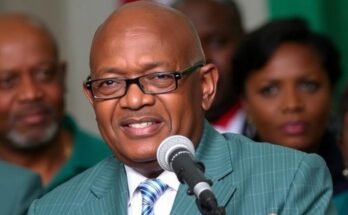Venezuela criticized Brazil for rejecting its bid to join the BRICS alliance, claiming Brazilian officials serve U.S. interests. This controversy stems from unresolved tensions following disputed presidential election results. Brazil’s former foreign minister attributed diplomatic discomfort to Venezuela’s lack of transparency in its election process, while Venezuela’s government condemned Brazil’s actions as interventionist.
On Wednesday, Venezuela’s government intensified its criticism of Brazilian foreign relations officials, asserting that their actions are compromising diplomatic relations between the two neighboring South American nations and are aligned with U.S. interests. This escalation came subsequent to a statement from a key foreign policy adviser to Brazilian President Luiz Inacio Lula da Silva, confirming Brazil’s non-support for Venezuela’s recent attempt to join the BRICS coalition of developing economies during the group’s summit in Russia. This non-support has exacerbated existing tensions tied to the disputed results of Venezuela’s July presidential election, as well as Brazil’s demands for transparency in the electoral process. Venezuela’s Foreign Relations Ministry publicly summoned Breno Hermann, Brazil’s chargé d’affaires in Caracas, to convey its vehement denunciation of what it describes as the recurring interventionist and disrespectful remarks from Brazilian officials. The ministry explicitly criticized Celso Amorim, Brazil’s former foreign affairs minister, for what they perceived as his advocacy for American interests by commenting on Venezuelan democratic processes, threatening the bilateral relations between Venezuela and Brazil. During a legislative session on Tuesday, Amorim acknowledged the “discomfort” characterizing the relationship between the two countries, attributing it to the Maduro government’s reluctance to disclose comprehensive electoral results that could substantiate President Maduro’s victory. He remarked that the improvement of diplomatic relations would hinge on actions taken by Venezuela, albeit without specifying any forthcoming actions. Venezuela’s electoral body claims that technical difficulties arising from a cyber-attack hindered their ability to publish detailed results from the election. In contrast, the primary opposition coalition maintained that it had obtained and widely circulated vote tally documents from over 80% of the electronic voting machines, subsequently asserting that Edmundo González, their candidate, had won decisively against Maduro. In the wake of the July election, the efforts of leftist leaders, including President Lula of Brazil, Colombian President Gustavo Petro, and former Mexican President Andrés Manuel López Obrador—who sought to mediate the election controversy—failed to achieve any productive resolution. President Maduro has since reinforced his authority, altered his Cabinet, and imprisoned over 2,000 political adversaries. As the BRICS bloc continues to expand, having initially included Brazil, Russia, India, China, and South Africa, new members such as Iran and Saudi Arabia have joined. Brazil, however, opposed Venezuela’s admission to the group during the recent summit. Amorim emphasized that “Brazil does not want an indefinite expansion” and expressed that Brazil believes member states should possess sufficient influence to represent the region effectively, asserting that Venezuela currently falls short of these criteria, while reiterating the importance of consensus in decision-making.
The ongoing geopolitical tensions in South America have come to a head with Venezuela’s exclusion from BRICS, a coalition of developing economies that Brazil is a part of, which includes major emerging markets. President Nicolás Maduro’s government has faced increasing scrutiny from regional leaders, particularly over electoral transparency following Venezuela’s disputed presidential elections. The refusal by Brazil to support Venezuela’s BRICS membership is also seen in conjunction with broader U.S. influence in the region, intensifying the critique from Venezuela. Furthermore, Brazil’s diplomatic stance reflects a significant shift in Latin American relations and the increasing discontent with Venezuela’s political situation.
In summary, Venezuela’s rejection from the BRICS alliance has ignited a new wave of tensions with Brazil, following accusations from Venezuela regarding interference by Brazilian officials. The situation is largely influenced by unresolved electoral disputes from Venezuela’s recent presidential election and highlights broader geopolitical dynamics within South America. Brazil’s opposition to Venezuelan inclusion in BRICS, coupled with ongoing diplomatic strains, suggests a complex future for relations between these two neighboring nations.
Original Source: apnews.com




